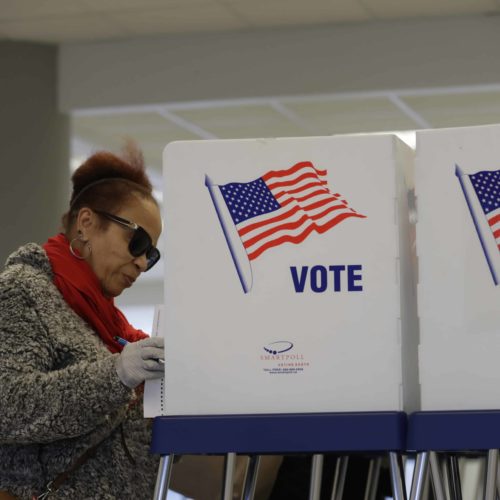Introduction
The Center for Public Integrity is a nonprofit newsroom that investigates betrayals of public trust. Sign up to receive our stories.
Some states aren’t sure if they can claim their share of emergency funds Congress approved to help states meet pandemic-related expenses for administering 2020 elections, citing conditions on the money.
The U.S. Election Assistance Commission, which is coordinating the flow of $400 million to the states, had received request letters from 37 states as of Tuesday.
For some of the remaining states, a major obstacle is a requirement that they match 20 percent of the federal money with their own dollars — at a time when the coronavirus outbreak is straining state budgets and draining surpluses.
The National Association of Secretaries of State has told lawmakers that the matching requirement will be “extremely difficult” for states to meet. Election officials from both parties have also raised concerns and said Congress should lift or reduce the match requirement.
The federal money must be spent this year on costs states incur as a result of the pandemic, such as sanitizing polling places, printing additional absentee ballots and postage costs required by increased use of vote-by-mail options, and states must promise the match to get the cash.
The states have two years to make the match available. But some states require legislative or election board approval before accepting the money.
The EAC said it is trying to distribute the money quickly and will provide states as much flexibility as possible on meeting the match.
In Arizona, the legislature has gone into indefinite recess because of the pandemic, said C. Murphy Hebert, director of communications for the Arizona secretary of state’s office. The state can’t take the money until the legislature approves, Hebert said.
Minnesota also needs legislative approval, something it is still working on getting in connection with previous federal election money, said Peter Bartz-Gallagher, director of communications for the Minnesota secretary of state.
We can’t do this work without your support.
In Maine, Secretary of State Matthew Dunlap called the federal election grant match “a nonstarter.” The legislature has adjourned, he said, and given declining revenue, it “is not going to be sympathetic to us when they do come back.”
Dunlap said Maine, which has delayed its primary until July, will likely have pandemic-related election expenses. For example, the city of Bangor’s sole polling place, the Cross Insurance Center, may be converted into a facility housing additional hospital beds, which could force officials to find a new polling place.
“A bunch of us had a conversation with a few members of Congress around this issue,” Dunlap said. “Congress understands now that the match is a problem.”
Justin Lee, Utah’s director of elections, said his office is working to assess how much money is left over from the state’s primary budget. He plans to ask the legislature to allow use of those funds as the match. He said the state may not claim the full $4.3 million in federal money it’s entitled to, so it may not need to come up with the entire $864,342 in matching funds.
The Utah legislature is searching for unspent state money to reallocate for coronavirus expenses, Lee said, and he’s asked them not to take the unspent primary funds. Lee said he’s grateful for the federal funding, but the match is “a strange situation to be put in if you don’t have $1 million sitting around,” he said.
States that don’t need legislative approval are taking other approaches.
Texas and Idaho, for example, are both working with county election officials to allocate the matching funds from already appropriated state money. Other states, including Oregon and Oklahoma, said they are still working with their legislatures to secure the match; Michigan said it’s still exploring sources for its share of the cash.
Vermont Secretary of State Jim Condos said the state can find the money for the match by spreading it over time, but “this is going to take some belt-tightening on our part, as it will on any state across the country.”
Democrats have called for billions more in federal money this year to safeguard elections against challenges presented by the pandemic. And last week, Senate Democrats put forth a new coronavirus relief proposal, valued at $500 billion overall, that included a provision removing the match on the already-allocated election money. It would have also tweaked reporting timeframes and other requirements on those grants.
But the package failed to pass.


Join the conversation
Show Comments